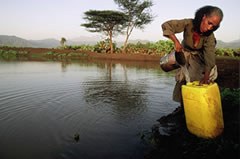
Contact: Louis Belanger, Oxfam media officer on, 202-496-1173; the following was written by Doe-e Berhanu
MEDIA ADVISORY, March 24 /Standard Newswire/ -- Two-hour treks to fetch water several times a day are now a thing of the past for some women in
Photo: Abraha Tarraken fills a container with water from a pond. Wargeba, Raya-Mehoni,
Ask any mother what she wants for her children and she will undoubtedly state that nothing less than the best will do for her precious ones. She is one to sacrifice everything in order to make sure that the needs of her children do not go unmet.
Alami Bera is one such woman living in
Up until the time Oxfam
With heavy clay water pots on their backs, women and young girls traveled great distances on foot to fetch water from polluted streams. The hardship of fetching water increased as the dry season advanced, with the water levels dropping and the streams running dry. Women then would have to trudge down deep gorges and climb back up, lugging six gallons of water—about 50 pounds—on their backs.
For the 80 households living in Alami's village, the only near source of water was an ella, or traditional well, located at the heart of the village. The well, about 82 feet deep, had never been fit for drinking, but Alami had no choice other than to let her family drink from it. When the seasonal ella ran dry, Alami and the other women in her village walked two hours to fetch water from the nearest stream. One trip was never enough to meet the daily water needs of a family of 14. In a society where the burden of fetching water falls on women and young girls, Alami had to travel to the stream two or three times a day to fetch water.
'I knew the water I was giving my children was making them sick, but you have to know that I had no choice,' said Alami. 'I had only two choices. Either give my family filthy water to drink and bathe in or don't give them any water at all.'
Plentiful Water but Limited Access
Oxfam
"Only a woman can fully appreciate what it means to have clean water near by," said Alami, pointing to the well and hand pump located only five yards from her thatch-roofed hut. "It now only takes me two minutes to pump out 7 gallons of clean water."
The hand-pumped well, which stands proudly in the middle of the village, is available five hours a day and the 80 households each get turns filling their jerricans for their daily use. The community imposed the five-hour limit to reduce wear and tear on the pump.
"What mother wouldn't give up everything she has to see her children's health restored?" asked Alami. "For the first time in our lives, our family is drinking and washing with clean water and using pit latrines."
Women in communities with the new wells are seeing some changes in gender role dynamics as more men are taking the initiative to fetch water for their families. It is a cultural taboo for a man to fetch water from a stream and carry it home on his back, so even the most helpful of husbands would only fetch water if the family owned a pack animal that could do the job.
"Imagine my husband sharing the water fetching responsibility with me," said Alami chuckling. "But he does it now, and I happily let him."




 Sign Up to Receive Press Releases:
Sign Up to Receive Press Releases: